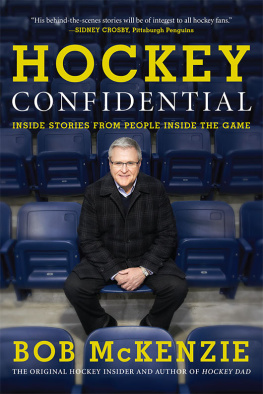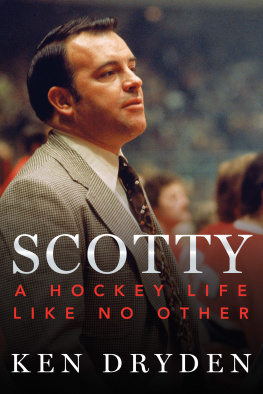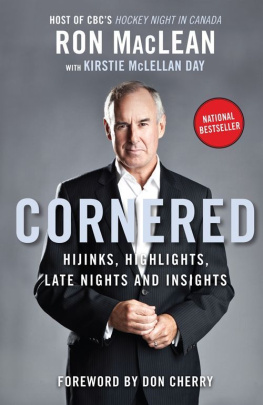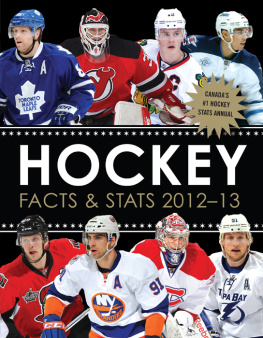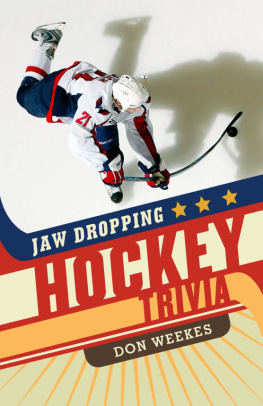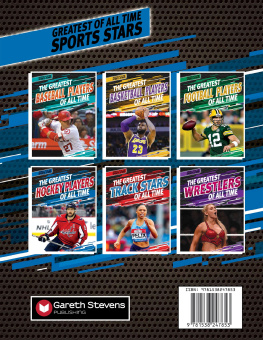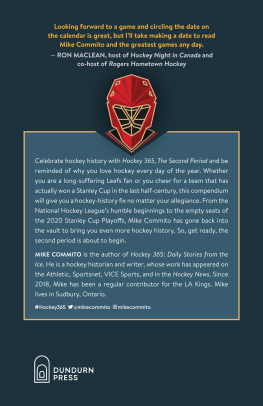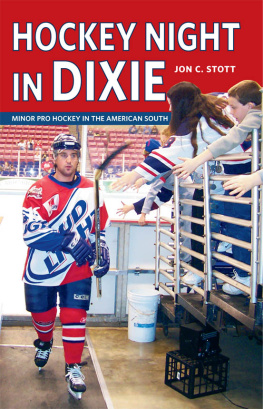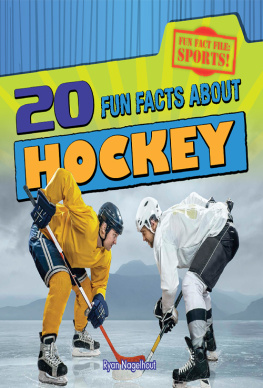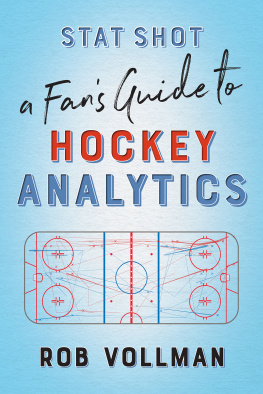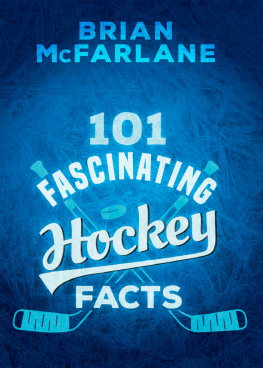
Hockey Facts & Stats
201011
Andrew Podnieks

Contents
It wasnt long after the final game of the 2010 Stanley Cup playoffs that many in the hockey world started to call the 2009 season the greatest on record. And with so much compelling evidence, its hard to argue.
The year began with first-overall draft choice John Tavares earning a spot in the lineup of the New York Islanders, joining a league that featured the rivalry of Sidney Crosby and Alexander Ovechkin. During the year, Martin Brodeur set all-time records for a goalie that might never be beaten, surpassing Terry Sawchuks once-untouchable career shutouts in the regular season and Patrick Roys marks for wins and minutes played.
In January, 2010, Canada and the United States played a thrilling gold medal game to cap the World Junior (U) Championship in Saskatoon, Saskatchewan, and during the event Steve Yzerman, Canadas executive director for the 2010 Olympic Winter Games in Vancouver, unveiled the Canadian lineup for the mens team.
The Winter Classic at Fenway Park in Boston between the Boston Bruins and Philadelphia Flyers was an unqualified success, and at games end Team USA general manager Brian Burke unveiled his roster for the Olympics.
The Olympics themselves were simply the greatest ever. Canada won gold thanks to a thrilling overtime goal from, who else, Crosby, just days after Canada hammered the Russians, , in perhaps the fastest, most skilful hockey game ever played. The final game was watched by some million Canadians, or per cent of the country, making it by far the most watched broadcast in Canadas history.
The womens finals also featured a CanadaUnited States showdown, and, as in 2002 , Canada won double gold. The heroes for the women were Marie-Philip Poulin and goalie Shannon Szabados, the former for scoring the only two goals of the game, the latter for her brilliant play in shutting out the Americans in a win.
The NHL season resumed, and the playoffs turned into one of the most exciting in recent memory, complete with upsets, dozens of playoff beards and only the occasional fight. The Montreal Canadiens thrilled fans across the country with their unexpected trip to the Eastern Conference final, and no one could have predicted Philadelphias march to the finals.
Chicago, on the other hand, was one team expected to go far with a lineup full of youth and speed and talent, and the Hawks didnt disappoint. Led by their incredible captain and Conn Smythe Trophy winner, Jonathan Toews, the Hawks won the Cup for the first time since 1961 . In the process, Toews joined the Triple Gold Club, having won the Olympic gold only months earlier and claiming gold from the World Championship in 2007 . He joined Eric Staal and coach Mike Babcock as TGC members, these men having completed their trifectas in Vancouver in February 2010 .
Indeed, it was a season to remember, one in which much went right and little went wrong (think head shots, the Phoenix Coyotes turmoil). As we head into the 2010 season, there is much to look forward to and much to enjoy, but last season will be a tough act to follow, thats for sure.
Andrew Podnieks
Toronto, August 2010
VANCOUVER, CANADA, February 1228, 2010
Results, Men
| Final Placing |
| GOLD MEDAL | Canada |
| SILVER MEDAL | United States |
| BRONZE MEDAL | Finland |
| Fourth Place | Slovakia |
| Fifth Place | Sweden |
| Sixth Place | Russia |
| Seventh Place | Czech Republic |
| Eighth Place | Switzerland |
| Ninth Place | Belarus |
| Tenth Place | Norway |
| Eleventh Place | Germany |
| Twelfth Place | Latvia |
| All-Star Team |
| Goal | Ryan Miller (USA) |
| Defence | Shea Weber (CAN), Brian Rafalski (USA) |
| Forward | Jonathan Toews (CAN), Pavol Demitra (SVK), Zach Parise (USA) |
| Directorate Awards |
| Best Goalie | Ryan Miller (USA) |
| Best Defenceman | Brian Rafalski (USA) |
| Best Forward | Jonathan Toews (CAN) |
| Tournament MVP | Ryan Miller (USA) |
TOURNAMENT FORMAT
The 12 teams were placed in three groups of four teams each and played a round-robin series of games within their group. The teams were then ranked according to their results, and the top four teams received byes to the quarterfinals. Teams 5 through 12 were re-seeded and played a single-game qualification round (5th vs. 12th, 6th vs. 11th, and so on). The winner of each game advanced to the quarterfinals, while the losers were eliminated. The quarterfinals and semifinals followed a single-game elimination format. The two semifinal winners met in the gold medal game, and the losers played for bronze.
FINAL STANDINGS



| February 16 | Russia 8/Latvia 2 |
| February 17 | Czech Republic 3/Slovakia 1 |
| February 18 | Slovakia 2/Russia 1 (SO) |
| February 19 | Czech Republic 5/Latvia 2 |
| February 20 | Slovakia 6/Latvia 0 |
| February 21 | Russia 4/Czech Republic 2 |

| February 17 | Finland 5/Belarus 1 |
| February 17 | Sweden 2/Germany 0 |
| February 19 | Sweden 4/Belarus 2 |
| February 19 | Finland 5/Germany 0 |
| February 20 | Belarus 5/Germany 3 |
| February 21 | Sweden 3/Finland 0 |
| Qualification Playoff |
| February 23 | Switzerland 3/Belarus 2 |
| February 23 | Canada 8/Germany 2 |
| February 23 | Czech Republic 3/Latvia 2 (OT) |
| February 23 | Slovakia 4/Norway 3 |
| Quarterfinals |
| February 24 | United States 2/Switzerland 0 |
| February 24 | Canada 7/Russia 3 |
| February 24 | Finland 2/Czech Republic 0 |
| February 24 | Slovakia 4/Sweden 3 |
| Semifinals |
| February 26 | United States 6/Finland 1 |
| February 26 | Canada 3/Slovakia 2 |
| Bronze Medal Game |
| February 27 | Finland 5/Slovakia 3 |
| Gold Medal Game |
| February 28 | Canada 3/United States 2 (OT) |
| Team Canada Statistics |
| Mike Babcock, coach |
Next page

